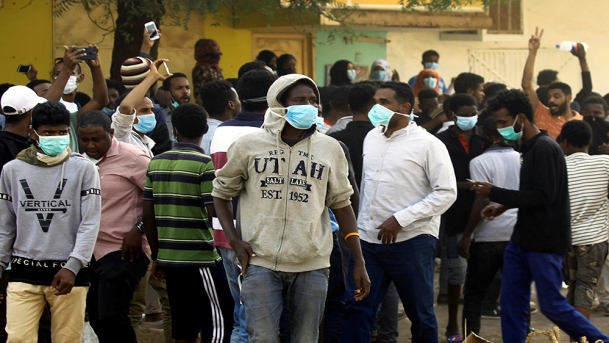
More than a month in, demonstrations in Sudan are still going strong, as the Sudanese struggle daily to meet their basic needs due to scarce commodities, exorbitant prices and the collapse of the Sudanese pound. While outrage at economic and social conditions sparked the demonstrations, the protestors soon began to call on President Omar al-Bashir to step down, holding him responsible for the country’s deplorable state after 30 years in power. Bashir has coped with the protests by recognising the legitimacy of the social and economic demands while attempting to delegitimise the political demands, portraying these as the work of outside forces seeking to spread chaos.
The conflict is now between two competing visions: where Bashir believes no political change is needed to address the crisis, the protestors are adamant that it can only be resolved with his departure. The question is which of these two positions will be victorious.
Four factors have boosted the momentum of the protests and weakened the Sudanese authorities’ control. First, the protests have spread throughout the country, severely straining the capacities of security and military forces and making it impossible for the authorities to defuse them using geographic and sectional appeals. Second, the protests are active in traditional regime strongholds, indicating a mounting crisis of confidence even among loyalists. Third, diverse social and geographic groupings have joined the demonstrations: workers and students, rural and urban dwellers, northerners and southerners. In addition to giving the protests national legitimacy, it has fostered real grassroots action. Fourth, coalitions have emerged that cross existing political and professional divisions. As these assume leadership, the protests are becoming less spontaneous and more organised.
As a result, cracks have appeared in the pillars of the regime: the intelligence service, the army, the security apparatus, and the ruling National Congress Party. Bashir’s intelligence chief recognised the legitimacy of the protests and refused to counter them with force. The armed forces and security personnel have similarly refused to use open force against protestors. Bashir’s political support has also eroded. There are reports that influential actors in the ruling party oppose his 2020 presidential bid, while the main opposition coalition has announced its support for the protestors and adopted the demand for Bashir’s ouster.
Bashir has attempted to shore up his regime with international and regional support, turning to Moscow, Gulf states and Turkey. But Moscow is not in a financial position to help resolve Sudan’s economic problems and, unlike Syria, has no grounds for military intervention. Regional states have provided enough aid to ameliorate the economic crisis in the short term, but this does not address the deep-seated causes of the dysfunction.
In light of this, three considerations will determine Sudan’s prospects moving forward: the urgency of the economic crisis, the tacit consensus to avoid the use of force and Bashir’s 2020 electoral aspirations, which means he must assuage popular anger, reach an agreement with the opposition and restructure his party’s ranks in record time. With this in mind, there are three possible scenarios:
- Economic emergency: the current tack pursued by Bashir; this involves mobilising Sudan’s foreign relations to find urgent economic aid. While some aid has been forthcoming, if more does not arrive quickly, it will not be enough to contain the protests. Moreover, emergency assistance will necessarily be temporary and cannot address the deep-seated, structural causes of economic failure and social resentment.
- A political bargain: Bashir could make a deal with the protestors and the political opposition, allowing him to keep the presidency and control of the security services in exchange for opposition control of parliament and a government with a broad economic mandate. But there is no guarantee that the protestors or the opposition would take such a deal, and the ruling party would oppose it since stands to lose the most.
- The military option: absent a political solution, the army and security forces will have two options: either force Bashir to step down or use excessive force to defend him. The desire of Sudanese armed forces to improve international relations and international pressure on the authorities suggest that the military will pursue the first option. It is also not impossible that extreme parties within the regime, with the help of foreign forces such as Egypt or the UAE, could pursue the Syrian option, taking up arms to prevent peaceful political change and preserve their own position.
*This is a summary of a policy brief originally written in Arabic, available here:
http://studies.aljazeera.net/ar/positionestimate/2019/02/190205122533437.html